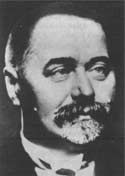Stjepan Radic
|
|
- The title of this article is incorrect because of technical limitations. The correct title is Stjepan Radić.
Stjepan Radić (May 11, 1871 – August 8, 1928) was a Croatian politician and the founder of the Croatian Peasant Party (CPP, Hrvatska Seljačka Stranka) in 1905. Although he is generally viewed as an obstructionist politician for his party's frequent boycotts of parliament, Radić is credited with galvanizing the Croatian peasantry into a viable political force for the first time.
After World War I he rose to political prominence among Croats for his opposition to merging Croatia with the Kingdom of Serbia without guarantees for Croatian autonomy. On November 24, 1918 he famously urged delegates attending a session that would decide the country's political future not to "rush like drunken geese into fog" — he feared that Croatia would become at best a minor partner within a Serb-dominated state.
However, the Kingdom of Serbs, Croats and Slovenes was established and two representatives of Radić's party (by then named the Croatian Common-people Peasant Party) were appointed to the Provisional Representation which served as a parliament until elections for the Constituent could be held. The parties representatives, however, decided not to take their seats. On the 8th of March 1919 the central committee passed a resolution that declared that "Croatian citizens do not recognize the so called Kingdom of Serbs, Croats and Slovenes under the Karađorđević dynasty because this kingdom was proclaimed other than by the Croatian Sabor and without any mandate of the Croatian People." The full statement was translated into French and sent abroad and provoked a decision by the government to arrest Radić along with several other party members. He was to be held some 11 months until February 1920.
The party's popularity in Croatia translated into significant electoral support but only among ethnic Croats. Radić still held on to the idea of an independent Croatia, and kept the party out of parliament in protest. This in effect afforded Serbian prime minister Nikola Pašić the opportunity to consolidate power and strengthen his Serb-dominated government. Returning from a trip to the Soviet Union in 1923, Radić was arrested for associating with Soviet Communists and imprisoned for two years. When he was released, he soon reentered politics and became minister of education.
Radić resigned his ministeral post in 1926 and returned to the opposition. This time the environment in parliament had become increasingly unstable and contentious.
At the end of 1927, Radić formed an alliance with Svetozar Pribičević of the Independent Democratic Party, the leading party of Serbs in Croatia at the time. The Peasant-Democrat coalition had a real chance to end the Pašić's Radicals' long-time control of the Parliament. Previously they had long been opponents, but the Democrats became disillusioned with the Belgrade bureaucracy and restored good relations with the Peasant Party with which they were allies in the time of the Austro-Hungarian Empire.
On the morning of the 20th June 1928 Radić was warned of danger of an assassination attempt against him and was begged to stay away from the Assembly for that day. He replied that he was like a soldier in war, in the trenches and as such it was his duty to go but he nevertheless promised not to utter a single word.
In the Assembly, Puniša Račić, a radical ethnic-Serb MP from Montenegro, got up and made a provocative speech which produced a stormy reaction from the opposition but Radić himself stayed completely silent. Finally Ivan Pernar shouted "Thou plundered beys". At this Puniša Račić drew out a revolver, shot Pernar and went on to shoot Radić and several other CPP delegates. (source: Zvonimir Kulundžić Atentat na Stjepana Radića/The assassination of Stjepan Radić)
Radić was left for dead and indeed had such a serious stomach wound that he died several months later.
Following the ethnic tensions triggered by the shooting, in January 1929 King Aleksandar Karađorđević abolished the constitution, dissolved parliament, and declared a royal dictatorship.
The picture of Stjepan Radić appears on the 200 kuna banknote.
External link
- Stjepan Radić (http://www.magma.ca/%7Erendic/radic.htm)de:Stjepan Radić

